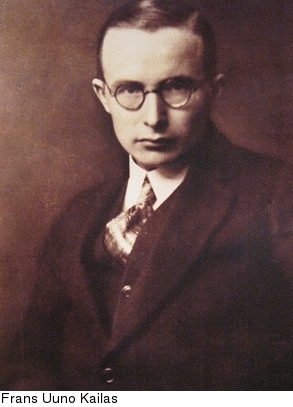
Uuno Kailas, writer, poet and author of the great nationalist poem, Rajalla.
Uuno Kailas, born Frans Uno Salonen (29 March 1901 – 22 March 1933) was a Finnish poet, author, and translator. After his mother’s death when he was two years old, he received a strict religious upbringing from his grandmother. He studied in Heinola and occasionally in the University of Helsinki. In 1919, he took part in the Aunus expedition, where his close friend Bruno Schildt, whom he had persuaded to take part, was killed. His feeling’s of guilt over the death of his friend found expression in his short story Bruuno on kuollut (Bruno is dead).
Kailas’ critical reviews and translations were published in Helsingin Sanomat and the literary magazine Nuori Voima. He also translated a considerable number of books into Finnish for various Finnish publishers. His first collection of poetry was “Tuuli ja Tähkä” (Wind and Cob) in 1922. Kailas served in the army from 1923 until 1925 and his next collection of poems Purjehtija (sailor) appeared in 1925 to positive reviews.
Along with Kaarlo Sarkia, Kailas was recognised as among the chief poets of the years between the world wars. Both Kailas and Sarkia returned to classical ideals of poetry and traditional metres with Kailas writing Uni ja kuolema (“Sleep and Death” – the work is considered his most significant and was the end result of his creative period over the previous ten years) in 1931 and holding a rigid moral code. The ideology of the right-wing movements in Finland is strongly reflected in Kailas’s poem “Rajalla” (On the Border). Like Kipling, Kailas saw an unresolved antagonism between East and West, seeing Finland as the guardian of Western culture on the Soviet border. In 1929, he was hospitalized due to schizophrenia, and at this time he was also diagnosed with tuberculosis. He died in Nice, France in 1933, and is buried in Helsinki.
Rajalla (On the Border)
Raja railona aukeaa (Like a chasm runs the border)
Edessä Aasia, Itä. (In front, Asia, the East)
Takana Länttä ja Eurooppaa; (Behind, Europe, the West)
varjelen, vartija, sitä. (Like a sentry, I stand guard)
Takana kaunis isänmaa (Behind, the beautiful fatherland)
Kaupungein ja kylin. (with its cities and villages)
Sinua poikas puolustaa (Your sons defend you)
Maani, aarteista ylin. (My country, the greatest treasure)
Öinen, ulvova tuuli tuo (Nocturnal howling winds bring)
Rajan takaa lunta. (Snow from across the border)
— Isäni, äitini, Herra, suo (Lord, let my mother and father)
Nukkua tyyntä unta! (Sleep, calmly dreaming!)
Anna jyviä hinkaloon, (Fill the bins with grain)
Anna karjojen siitä! (Let the herds breed)
Kätes peltoja siunatkoon! (Let thy hand bless the fields)
– Täällä suojelen niitä. (I am here, protecting them)
Synkeä, kylmä on talviyö, (The winter night is bleak and cold)
Hyisenä henkii itä. (There is an Icy breath from the East)
Siell’ ovat orjuus ja pakkotyö; (Over there is slavery and forced labour)
tähdet katsovat sitä. (the stars look down and see)
Kaukaa aroilta kohoaa (Far away on the Steppe rises)
Iivana Julman haamu. (The ghost of Ivan the Terrible)
Turman henki, se ennustaa: (A spirit of doom is at work, augering that
verta on näkevä aamu. (the morning shall see blood)
Mut isät harmaat haudoistaan (But fathers, gray, rise from their graves)
aaveratsuilla ajaa: (Phantom steeds they ride)
karhunkeihäitä kourissaan (Bear spears held in their hands)
syöksyvät kohti raja (Rushing towards the border)
—Henget taattojen, autuaat, (Blessed spirits of the forefathers)
kuulkaa poikanne sana — (Listen to your sons oath)
jos sen pettäisin, saapukaat (if I should betray my words, then come)
koston armeijana —: (as an army of vengeance)
Ei ole polkeva häpäisten (Their tread will not desecrate)
sankarileponne majaa (the resting place of your heroes)
rauta-antura vihollisen, – (From the iron-soled foot of the enemy)
suojelen maani rajaa! (I will protect your borders)
Ei ota vieraat milloinkaan (Strangers will never take)
kallista perintöänne. (your precious heritage)
tulkoot hurttina aroiltaan! (let them come like hounds from the steppes)
Mahtuvat multiin tänne. (they will find a place here under the soil)
Kontion rinnoin voimakkain (With a bears powerful chest)
ryntään peitsiä vasten (I charge against the lances)
naisen rukkia puolustain (defending your women’s spinning wheels)
ynnä kehtoa lasten. (and your children’s cradles)
Raja railona aukeaa (Like a chasm runs the border)
Edessä Aasia, Itä. (In front, Asia, the East)
Takana Länttä ja Eurooppaa; (Behind, Europe, the West)
varjelen, vartija, sitä. (Like a sentry, I stand guard)
 Copyright secured by Digiprove © 2013 Alternative Finland
Copyright secured by Digiprove © 2013 Alternative Finland


